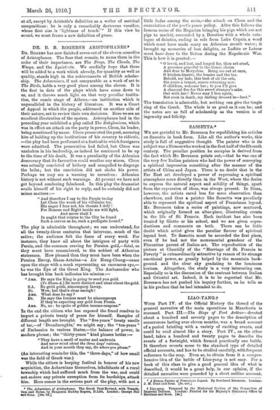• Tke deka:items of Aristopbanes. The Greek Teas Revised, with
Tranala- f Liao-yang. Prepared by the Historical Section of the Cemmittee of Son and Notes, by Benjamin Biekley Rogers. D.Litt. London: George Bell Imperial Defence. London: Printed for Ms Majesty's Stationery Office by M Sons. DOB. 6d.3 Harrison and Sons. Da] DR. B. B. ROGERS'S ARISTOPHANES.* DR. ROGERS has now finished seven out of the eleven comedies of Aristophanes. The four that remain, to name them in the order of their importance, are The Frogs, The Clouds, The Wasps, and the Lysistrata. We cordially hope that these will be added-to a work which already, for quantity as well as quality, stands high in the achievements of British scholar- ship. The Acharnians, if not comparable as a work of art to The Birds, holds a very good place among the eleven. It is
the first in date of the plays which have come down to us, and it throws much light on that very peculiar institu- tion, the comic stage of Athens,—an institution which is unparalleled in the history of literature. It was a Court of Appeal in which the people, addressed on another side of their nature, sat to review their own decisions. Here we see an excellent illustration of the system. Aristophanes had in the preceding year exhibited a play called The Babylonians, which was in effect an attack on the party in power, Cleon, its leader, being mentioned by name. Cleon prosecuted the poet, accusing him of holding up the institutions of his country to ridicule, —the play had been performed at a festival to which foreigners were admitted. The prosecution had failed, but Cleon was unshaken in his leadership, as indeed he continued to be up to the time of his death. It was a peculiarity of the Athenian democracy that its favourites could weather any storm. Cleon was actually convicted of bribery and compelled to disgorge the bribe; but the conviction did not shake his power.
Perhaps we may see a warning to ourselves : Athenian history is not without such warnings. At present we have not got beyond condoning falsehood. In this play the dramatist avails himself of his right to reply, and he certainly did not mince matters :— "And therefore I say to the People to-day Let Clean the worst of his villainies try.
His anger I fear not, his threats I defy !
For Honour and Right beside me will fight, And never shall I In aught that relates to the City be found Such a craven as he, such a profligate hound."
The play is admirable throughout ; we can understand, for all the twenty-three centuries that intervene, much of the satire; the audience felt the force of every word. For instance, they knew all about the intrigues of party with Persia, and the common craving for Persian gold,—fatal, as they must have remembered, to the noblest of Athenian statesmen. How pleased then they must have been when the
Persian Envoy, Sham-Artabas—a Lie Hung-Chang—came upon the stage with a mask representing an enormous eye,—
he was the Eye of the Great King. The Ambassador who has brought him back indicates his mission :—
" AXIL He says the Ring is going to send you gold.
(To Bham-A.) Be more distinct and clear about the gold.
SA. No getti goldi, nincompoop lawny. Dx. Wow, but that's clear enough !
Airs. Whatdoeshe say Di. He says the Ionians must be nincompoops If they're expecting any gold from Persia.
AMB. No, no : he spoke of golden income-coupons."
In the end the citizen who has exposed the fraud resolves to import a private treaty of peace for himself. Samples of different length are brought. The " five-years " treaty smells of tar,—of Dreadnoughts,' we might say ; the " ten-years " of Embassies to various States,—the balance of power, in modern phrase ; the " thirty-years " kind pleases better :— " They have a smell of nectar and ambrosia
And never mind about the three days' rations, And in your mouth they say, Go where yOU ;)lease."
(An interesting reminder this, the "three.days," of how small was the field of Greek war.) While the citizen is keeping festival in honour of his new acquisition, the Acharnians themselves, inhabitants of a rural township which had suffered much from the war, and could not endure any private exemption from its hardships, attack him. Here comes in the serious part of the play, with not a little ludus among the seiia,—the attack on Cleon and the enunciation of the poet's peace policy. After this follows the famous scene of the Megarian bringing his pigs which are not pigs to market, succeeded by a Boeotian with a whole cata- logue of dainties, ending in eels from Lake Copes, a word which must have made many an Athenian mouth water; it brought up memories of lost delights, as Lafitte or Latour must have done to the Briton during the Napoleonic War. This is how it is greeted :—
" 0 loved, and lost, and longed for, thou art cruel, A presence graceful to the Comic choirs And dear to Morychus. Bring me out at once, 0 kitchen-knaves' the brasier and the tar. Behold, my lads, this best of all the eels, Six years a truant, scarce returning now. 0 children, welcome her ; to you I'll give A charcoal fire for this sweet stranger's sake. Out with her! Never may I lose again, Not even in death, my darling dressed in—beet."
The translation is admirable, but nothing can give the tragie ring of the Greek. The whole is as good as it can be ; and the notes are as full of scholarship as the version is of ingenuity and felicity.






































 Previous page
Previous page